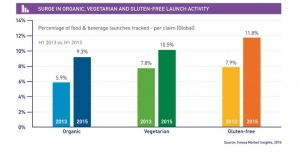07.22.15
DSM has introduced a digestive enzyme demonstrated to effectively break down residual gluten in the stomach to the U.S. dietary supplement market. Tolerase G — or Aspergillus Niger prolyl endoprotease (AN-PEP) —positioned for the rising number of gluten sensitive consumers following a gluten-free diet who want help digesting hidden or residual gluten that may be found in a broad range of foods. The results of a new in vitro study published in the peer-reviewed journal, PlosONE, show that the AN-PEP digestive enzyme degrades gluten molecules in the stomach more effectively than other commercially available supplements.
Gluten is present naturally in certain grains, and may often be found in processed foods. It is difficult for consumers looking for gluten free diet because gluten free products may not always be at hand during social events or traveling. Gluten sensitive consumers following a gluten-free diet could benefit from using Tolerase G. This product, however, is not intended for individuals with celiac disease or who are gluten intolerant. For individuals with gluten intolerance, a lifelong gluten free diet is the only available treatment. In the U.S., sales of gluten-free products are predicted to reach $2.34 billion by 2019. Almost 82% of consumers who buy gluten-free foods have not been diagnosed with celiac disease.
The first paper on the gluten-degrading effect of the AN-PEP enzyme was published earlier this year in Alimentary Pharmacology and Therapeutics. The randomized, double-blind, placebo-controlled study concluded that AN-PEP enhanced gluten digestion of healthy volunteers within a one hour period, irrespective of the caloric content of the meal.
“A growing number of people now opt to follow a gluten-free diet, but until recently it was difficult for dietary supplement manufacturers to match consumer demand as the available digestive enzymes were not effective in degrading gluten in the stomach,” comments Thierry Garrier, marketing director at DSM. “Tolerase G is the result of significant research, carried out over a number of years, to show the efficacy and safety of the enzyme. The new science gives manufacturers the evidence they need to educate consumers on the benefits offered by this unique ingredient.”
For more information: www.dsm.com/tolerase-g
Gluten is present naturally in certain grains, and may often be found in processed foods. It is difficult for consumers looking for gluten free diet because gluten free products may not always be at hand during social events or traveling. Gluten sensitive consumers following a gluten-free diet could benefit from using Tolerase G. This product, however, is not intended for individuals with celiac disease or who are gluten intolerant. For individuals with gluten intolerance, a lifelong gluten free diet is the only available treatment. In the U.S., sales of gluten-free products are predicted to reach $2.34 billion by 2019. Almost 82% of consumers who buy gluten-free foods have not been diagnosed with celiac disease.
The first paper on the gluten-degrading effect of the AN-PEP enzyme was published earlier this year in Alimentary Pharmacology and Therapeutics. The randomized, double-blind, placebo-controlled study concluded that AN-PEP enhanced gluten digestion of healthy volunteers within a one hour period, irrespective of the caloric content of the meal.
“A growing number of people now opt to follow a gluten-free diet, but until recently it was difficult for dietary supplement manufacturers to match consumer demand as the available digestive enzymes were not effective in degrading gluten in the stomach,” comments Thierry Garrier, marketing director at DSM. “Tolerase G is the result of significant research, carried out over a number of years, to show the efficacy and safety of the enzyme. The new science gives manufacturers the evidence they need to educate consumers on the benefits offered by this unique ingredient.”
For more information: www.dsm.com/tolerase-g



















